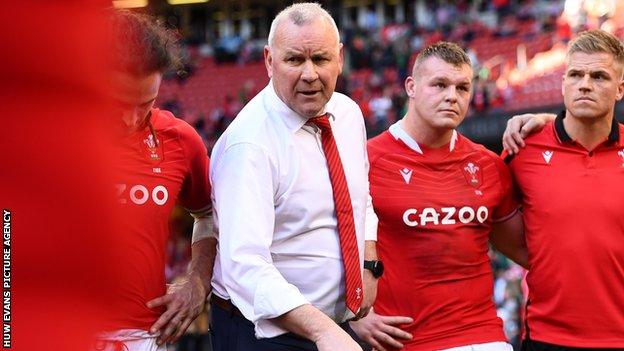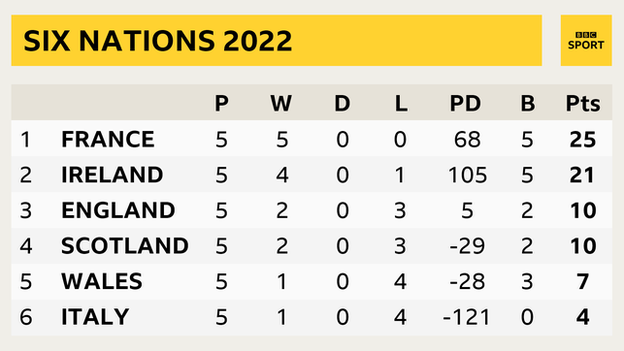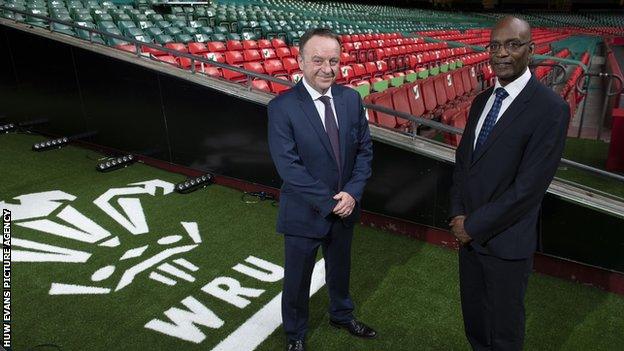Six Nations 2022: After Italy woe, what next for Wayne Pivac's Wales?
- Published
Six Nations highlights: Wales 21-22 Italy
Here we are again. The boom and bust nature of Welsh rugby.
From the peak of becoming Six Nations champions a year ago, Wales find themselves back in a trough after being embarrassed by Italy in Cardiff.
While Italy deserve plaudits, Wales deserve criticism. It was meant to be the dream day to commemorate the magical milestones of Alun Wyn Jones and Dan Biggar but a nightmare ensued.
From fifth place to first and back to fifth in three Six Nations tournaments. That is Wayne Pivac's inconsistent record since he took over from Warren Gatland after the 2019 World Cup.
Welsh rugby has been here before but it is hard this time not to be concerned about the state of the game overall.
That is not just because the national side have struggled in this tournament, but because past successes have papered over cracks.
It is difficult to ignore the creaking foundations of what is considered Wales' national sport.
The domestic professional sides are failing and the Welsh Rugby Union (WRU) faces questions over its governance of the game.
For some, these issues can be brushed aside when Wales are winning Grand Slams and Six Nations championships.
But a first home defeat to Italy? That is different. A potential watershed moment - or at least it should be.
Dragons director of rugby Dean Ryan has not been successful in his role so far but was correct earlier this year when he called for the creation of a long-term plan for Welsh rugby.
Such a plan has never seemed more necessary than it does now as Wales finish this Six Nations tournament ninth in the world rankings.
If Welsh rugby is not in crisis already, it is not far off.
Pivac question

Wales head coach Wayne Pivac has had previous stints with Scarlets and Fiji
In the immediate aftermath of Italy, an emotional Dan Biggar said some players might have had their last chances to play for Wales, but what about the coaching staff?
Pivac's future will be under scrutiny. A scroll through social media following Saturday's final whistle confirmed that.
Since taking over from Gatland, Pivac has won 11, lost 15 and drawn one of his 27 competitive games.
During that time, he has overseen two Six Nations campaigns where Wales have only won one game, either side of the 2021 championship-winning team that was a minute away from clinching the Grand Slam.
But Pivac is also now the only Wales coach to lose at home to Italy. New territory.
A tournament that started disastrously in Dublin finished in similar fashion against the inspirational Italians.

People are inevitably questioning Pivac's position and whether he is the man to lead the squad to the 2023 World Cup.
His response to such questions?
"They're entitled to their view," Pivac said. "On the basis of the competition we had last year with the squad and what we did over the last three weeks, building depth and having creditable performances against quality opposition, Italy is a backward step.
"There's no doubt and hiding from that. There are people in positions higher up than myself that make the decisions you're alluding to. Look, I'm not bothered by that.
"It's about doing what we think is the right thing for this group and we believed in the squad we put out there.
"We'll review this game and make sure the improvements that need to happen, happen.
"You have to take a big, deep breath, count to 10, sleep on it. Let those emotions subside, reflect and look at the performance.
"It's probably the lowest point in most of the players' careers in terms of pulling on the Welsh jersey and the pride they have in doing that.
"Losing a home game against Italy was not in the script, so it's very disappointing.
"It is fine margins, but we have to stay strong and believe in what we are doing. This group does that, and we believe in the players we have."
Pivac has said all along he is planning for the World Cup and nothing has changed on that front.
Six Nations: Wales' Josh Adams gives man-of-the-match medal to Italy's Ange Capuozzo
Attacking concerns
After four tries were conceded against Ireland, Gethin Jenkins' defensive system has been quietly effective in this campaign, with only four more leaked in Wales' other games, but many are left scratching their heads at Wales' attacking gameplan.
What does a Pivac Wales side actually look like? A new, exciting, evolving game was promised when he and attack coach Stephen Jones came in.
That kind of game has only been witnessed towards the end of the 2021 Six Nations, in which Wales managed their tournament record of 20 tries.
In contrast, this season there have been just eight, with the lack of an offensive pattern emerging.
"Clearly we need to get our attacking game complete and by that I mean being ruthless, so that when we do create opportunities we seize on them," added Pivac.
The Wales coach can point to the fact his side outscored the opposition by three tries to one in defeats to England and Italy. The other viewpoint is that they managed only two tries in the other three games.
Injuries have hampered Pivac with Justin Tipuric, George North, Dan Lydiate and Ken Owens missing the tournament and Josh Navidi, Taulupe Faletau and Alun Wyn Jones introduced later on, but Pivac has not named an unchanged side during his reign.
Inconsistent selections during this tournament have not helped, with wing Josh Adams playing at centre against Ireland, lock Seb Davies picked at flanker and Jones brought back for his first game in almost five months this weekend at the expense of Will Rowlands.
Selection has seemed muddled, with no settled centre partnership or back-row unit, as Wales hoped to stumble upon a winning formula.
More often than not, Gatland got selection right during his 12-year tenure. Pivac has to follow suit.
Regional woes
The recent malaise cannot only be pinned on Pivac and his players and coaches.
As in most years, Wales players came into Six Nations camp from struggling regions.
Ospreys, Dragons, Scarlets and Cardiff are currently languishing in the bottom half of the United Rugby Championship.
The four professional sides have lost all 11 games in the two European tournaments so far, with Scarlets and Ospreys eliminated after finishing bottom of the two Champions Cup pools.
In previous years, Wales have managed to overcome these shortcomings, but there has to be a tipping point.
Wales have been relying on players who are the wrong side of 30 and have produced some wonderful moments for the nation. Developing the next generation is now the priority.
The professional sides have developed players for the national side in recent seasons and the WRU cannot just take this for granted.

Welsh Rugby Union chief executive Steve Phillips (left) brought in performance director Nigel Walker
Governing body needs to step up
The regions have their failings but they also have funding issues compared to sides in France, Ireland and England. There has been a feeling that too much emphasis has been put on 'Team Wales' in recent years.
The Professional Rugby Board (PRB) was set up in 2018 with representatives from the region and WRU as a body to run the professional game more effectively. So far there is not much evidence of that happening.
The regions and WRU have been discussing a £20m Covid-19 loan, although that appears now to have been renegotiated.
Tensions remain, though, between the parties.
Pivac alluded to those above him who will make key calls, which will include whether Wales' coaching staff remain in situ.
The decision makers include WRU chief executive Steve Phillips and chairman Rob Butcher, while former Wales wing Nigel Walker offers rugby expertise as performance director.
Since he was appointed in 2021, Walker has concentrated on the women's game, overseeing the historic implementation of the first professional contracts for Wales players.
Now he must turn his attention to the men's professional game and the WRU has to look at the structure, because the current one is not working.
After Italy, the WRU and Walker must take responsibility and lead a review process.
Immediate future
It does not get any easier for Wales. Should the WRU hierarchy back Pivac to lead Wales into next year's World Cup - and there is no suggestion at this point that they will not - a three-Test trip to South Africa beckons for the New Zealander and his team this July.
Prior to the summer, the majority of players will return to their regions to play out a season where there is little chance of silverware.
Finishing in the top eight of the URC - plus, in Cardiff's case, achieving something in the Challenge Cup - is all they can realistically look forward to.
That is hardly ideal preparation for playing the world champions in Pretoria, Bloemfontein and Cape Town.
Such a challenge would test any side, never mind a Wales team that has struggled this year and could not even beat Italy at home.

